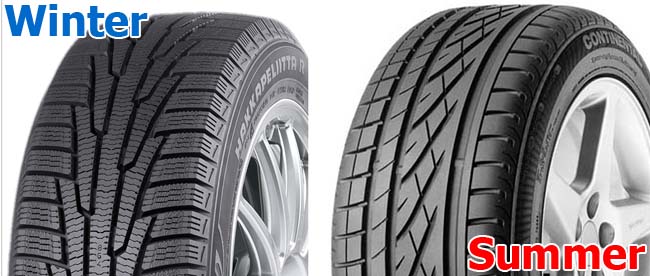5 reasons why treating your winter tires as all-seasons is dangerous.

Looking for new tires or tire storage? Shop online here!
After a typically rainy and extremely snowy Lower Mainland winter, the sun is shining, the birds are singing, and warmer temperatures are finally here to stay.
Although temperatures are now reaching 15 degrees Celsius, it is not uncommon to see cars in the Lower Mainland still fitted with their winter tires.
If you are one of these individuals, here are a few reasons why you need to swap to your summer or all-season tires immediately.
1. Winter tires are made for a lower temperature range than all-season or summers tires
Many drivers think that they can save money by riding their winter wheels all year round. Surely if a tire that can handle tough winter conditions can handle warmth, right?
Unfortunately this is completely wrong. All tires start life with differently engineered rubber compounds, each designed for specific temperature ranges.

Winter tires are designed to have flexible tread below the freezing mark. Compared to summer compound tires, which have a lot of smooth tire blocks for maximum surface area grip, winters have a lot more sipes and softer compound tread blocks.
These flexible heavily siped blocks are designed for gripping onto uneven snowy or icy surfaces and not for consistently dry and warm pavement.
2. Your winter tires will wear much faster above 7 degrees Celsius
As the aforementioned sipes and tread blocks come into contact with the dry and warmer spring pavement, heat is created as the rubber blocks are compressed.
Why? Because the sipes rapidly open and close as they come into contact with the dry pavement with no snow or ice to cool them down. And too much heat is the worst enemy of a tire.
3. You will not be able to stop your car as quickly
By design, compared to a good all-season tire, a winter tire will have 2-3 times as many tread blocks. On dry and warm pavement though, this flexible-by-design construction can make stopping distances significantly longer.

Regardless of the type of tire, too much heat makes a tire’s tread blocks too flexible. The tire will have a squirmy or greasy feel because it is literally chemically dissolving.
At over 30 degrees Celsius, the winter tires’ rubber will start to marble. A dangerous situation as little rubber balls are formed and will spin under the wheel.
A 2012 Consumer Reports study found that winter tire equipped cars (in spring/summer conditions) needed one-and-half to two car lengths more stopping distance! The hotter the ambient temperature, the longer the stopping distance. A potentially dangerous scenario.
4. You will not be able to control the car as well
A winter/summer tire comparison study done by Continental Tires found that there is around 15 per cent less steering precision when using winter tires during warm spring/summer temperatures.

The same study found that in summer conditions, winter tires reached their critical limits below 70 km/hr during an avoidance maneuver. By contrast, the same maneuver is unproblematic even at 80 km/hr when equipped with summer tires.
5. You will be spending more money on fuel
Due to the softer and stickier rubber compound, winter tires have a much higher rolling resistance.

Rolling resistance is defined as the energy that is lost when the tire is rolling. The main reason for loss of energy is the constant deformation of the tire.
The level of wear on winter tires is high at warm times of the year and the rolling resistance is 15% higher than that of summer tires.
Final Tip
When you are swapping your tires, be sure to take a look at the amount of tread left on your winter tires. For the best traction in snow, tire manufacturers recommend a minimum tread depth of 6/32 of an inch.
For comparison, most tires come with new with about 11/32 to 12/32 of an inch tread depth.
If you do not have the recommended amount, now is a good time to plan ahead to save money for new winter tires well in advance of the next winter season.


